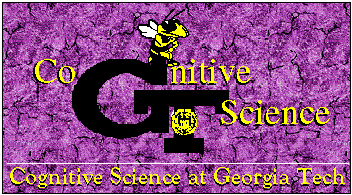

The Artificial Intelligence research group consists of eight full-time academic faculty members: Professors Ronald Arkin, Chris Atkeson, Kurt Eiselt, Ashok Goel, Mark Guzdial, Janet Kolodner, Daryl Lawton, and Ashwin Ram; and five research scientists: Drs. Richard Billington, Terry Chandler, Eric Domeshek, Mimi Recker, and Linda Wills. As a group, their research covers much of the Artificial Intelligence research spectrum, ranging from use of knowledge in problem solving, language processing, explanation, perception, and robotics; to representation and organization of knowledge; to acquisition of knowledge, learning, and instruction. Much of their research has a strong cognitive flavor to it. Some of it is inspired by cognition while some explicitly models cognitive processes.
The Cognitive Psychology faculty in Cognitive Science includes Professors Dorrit Billman, Susan Bovair, Richard Catrambone, and Tony Simon. Their research interests cover both empirical and computational investigations of a wide range of topics. These include object and event categorization, natural language processing, problem solving, conceptual development, human-computer interaction, inductive reasoning, and learning from examples, amongst others. Other faculty in the School of Psychology are carrying out related work including the study of cognitive aging and engineering psychology. Faculty in School of Literature, Culture, and Communication include Professors Chuck Bazerman, Wendy Newstetter, and Nancy Nersessian; their research interests cover writing, multimedia, and philosophy of science.
The Human-Machine Systems Research Center research group has a strong research program in cognitive engineering, carried out by Professors T. Govindaraj, Alex Kirlik, and Christine Mitchell. Their research interests concern the development of theoretical frameworks to guide the design of interfaces, aiding systems, and training techniques to support efficient human-machine interaction in complex systems. The Georgia Tech Research Institute, similarly, has a large research and development program in several aspects of applied AI and Cognitive Science, including expert systems, cognitive engineering, and neural networks. The Graphics, Visualization and Usability group in the College of Computing conducts research in cognitive aspects of Human-Computer Interfaces.
To students in each of the three main groups we offer a Cognitive Science certificate program in collaboration with our colleagues in other academic units. This is an interdisciplinary program dealing with fundamental problems in cognition. The program includes courses from each home department as well as cross-referenced courses taught by faculty from Artificial Intelligence, Psychology, English, Industrial and Systems Engineering, and other disciplines.
 Back to the Cognitive Science Home Page.
Back to the Cognitive Science Home Page.